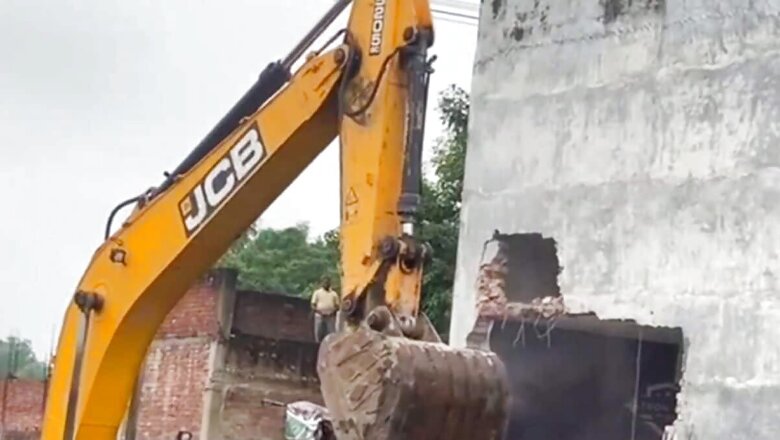
views
In recent years, bulldozers have become a significant symbol in politics, with their roar resonating across various states, including Uttar Pradesh. However, one administrative officer in UP gained a reputation as ‘Bulldozer Baba,’ known for his decisive actions against illegal encroachments.
Hardev Singh, who served as an Additional District Magistrate (ADM), earned this name due to his aggressive stance on removing encroachments. His reputation was solidified in Allahabad, now known as Prayagraj, where his efforts to clear illegal structures captured widespread attention.
Singh’s most notable intervention came during his tenure in Allahabad in 1994-95 while overseeing the Kumbh Mela as Additional Fair Officer. During that time, he initiated a significant cleanup operation by targeting encroachments in the Bandhwa area, which included not only temporary structures but also illegal constructions encroaching upon the dam built to protect the city from River Ganga’s floods.
The dam, known as Badhwan, separates the Ganga and the city, and has a critical role in flood management. Singh’s crackdown included removing unauthorised constructions around the Vishal Shankar Mandapam temple and other nearby areas. His actions led to protests from local religious leaders who had occupied land for their residences and smaller temples. Despite their appeals to the High Court, which refused to intervene, Singh stood firm, emphasising that the dam’s integrity was crucial for the city’s safety.
Singh’s firm stance and pragmatic approach – promising to build a new temple and install idols respectfully if the protests continued – ultimately led to the cessation of resistance. His actions not only reinforced the importance of adhering to legal boundaries but also highlighted the often contentious intersection of politics, religion, and urban management in UP.
The Origins of ‘Baba’ in Hardev Singh’s Name
Singh’s ‘Baba’ persona wasn’t tied to religious practices; he served as ADM in Aligarh from 1985 to 1988, well before his actions in Banaras (Varanasi). During his posting in Aligarh, Singh’s diligent work led local youths to initiate a cleanliness campaign, inviting him to speak. During his speech, the youths compared Singh’s role to that of a family guardian, affectionately calling him ‘Baba,’ a term denoting respect and leadership. Singh recalled this, saying that the media picked up on this and began referring to him as ‘Baba’.
Clearing Encroachments in Ghaziabad
In his role as Chief City Officer of Ghaziabad, a position now known as Nagar Ayukt, Hardev Singh made headlines for his decisive action against encroachments. Singh tackled illegal shops encroaching on a park near the Municipal Corporation. Despite initial scepticism from police officers, Singh issued legal notices to the shopkeepers, warning them to either obtain a court order or vacate their premises. The result was swift: in just two and a half hours, two bulldozers cleared the encroachments, an event that made headlines.
In Ghaziabad, Hardev Singh recounted a notable encounter with former MP DP Yadav. Singh’s team had marked part of Yadav’s property for encroachment. Upon receiving the notice, Yadav personally contacted Singh, requesting that the bulldozers be withheld to prevent damage. Yadav assured Singh he would remove the encroachment himself within six days and invite Singh to verify the action. True to his word, Yadav cleared the encroachment as promised.
Transforming Varanasi’s Streets
Hardev Singh is also recognised for his significant contributions to Varanasi’s urban landscape. During his tenure as Chief City Officer and Vice President of the Varanasi Development Authority from 1997 to 1999, Singh played a pivotal role in clearing the narrow lanes of encroachments. Singh leveraged his reputation to issue a notice in local newspapers, warning residents that encroachments on drains and roads would be demolished at their expense. The notice also addressed illegal balconies encroaching on roadways, stipulating that the Municipal Corporation would handle demolitions and recover costs.
This proactive approach led many residents to voluntarily remove encroachments and debris, facilitating smoother traffic and better urban hygiene in Varanasi.
Singh, known for his integrity in every posting, emphasised that honest and unbiased work was crucial for effective governance. He firmly believes in ensuring that the public benefits from civic services. “I worked on the principle that people should receive proper civic facilities. I was always vigilant,” he recounted.
For instance, if complaints about sewer overflows and resulting hygiene issues were ignored, Singh would personally intervene. He would summon the health department in charge and threaten to set up a cot outside the complainant’s house, ensuring the department understood the urgency of resolving the issue. This approach typically led to swift resolutions.
Leadership and Political Ventures
Singh also served as President of the Uttar Pradesh PCS Association, where he frequently urged fellow officers to reform their practices, though his advice was often disregarded. He briefly ventured into politics, contesting in the Graduate Constituency of the Legislative Council and later joining the Rashtriya Lok Dal (RLD). However, Singh soon realised that politics was not his calling, describing his foray as an “experiment which did not succeed.”




















Comments
0 comment